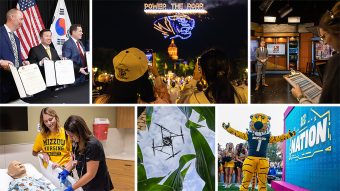
Nov. 6, 2025
Contact: Janese Heavin, heavinj@missouri.edu
Photo by Abbie Lankitus
For generations, community newspapers have been the backbone of local life — chronicling everything from city council meetings and high school sports to church suppers and county fairs. They connect neighbors, celebrate local successes and share the kind of news that larger outlets often overlook.
The University of Missouri is helping ensure those stories continue to be told. Through its Missouri School of Journalism, Mizzou is strengthening the connection between classrooms and communities by supporting small-town news organizations across the state.
At the heart of that effort is the Missouri News Network, which encompasses five university-owned outlets, including the Columbia Missourian. These community-focused newsrooms double as training grounds where students gain real-world experience under the guidance of professional journalists.
But Mizzou’s commitment to journalism extends beyond Columbia. Through partnerships and reporting services, the School of Journalism helps sustain trusted local news throughout Missouri.
“It’s a responsibility we take seriously,” Elizabeth Stephens, executive editor of the Columbia Missourian, said. “We are the first journalism school in the country and a land-grant university, so it’s our mission to set the example. Yes, we train students to be journalists, but we also serve as a lab for the industry. Everything we do — from preparing students to return and work in their community newsrooms to partnering with MU Extension to distribute certain publications statewide — reflects our goal of having a broader impact across the state.”
Here are three ways the Missouri School of Journalism is bolstering community newsrooms.
Providing digital ambassadors
Community newspapers are often understaffed, making it difficult to keep up with ever-changing technologies, tools and trends. That’s where the Potter Digital Ambassadors program — part of the Reynolds Journalism Institute — comes in.
Founded with support from Walter B. Potter Jr., who earned his master’s degree in journalism from Mizzou, the program sends students to work with community news outlets for one week during winter break. The digitally savvy students assess newsroom practices and make recommendations that staff can implement.
“Ambassadors are there to teach the newsroom,” Stephens said. “They’re the experts when it comes to social media, analytics, web performance and capturing video content from phones. These are the types of tools that can boost readership but often get pushed to the back burner for community newspapers trying to keep up with everyday duties.”
In past years, students have helped newspapers rethink email strategies and set up Google Search Console to improve search engine optimization. This year, ambassadors will help news outlets, including broadcasters, better understand and develop policies around artificial intelligence.
With ongoing involvement and investment from Potter, the Reynolds Journalism Institute is now working with partner universities to expand the ambassadors’ program beyond Missouri. This year, press and broadcast associations in Kansas, Iowa, Tennessee and Vermont will deploy journalism students from partner universities to newspapers and radio stations in their states.
Acquiring a neighboring newspaper
While the Potter Digital Ambassadors program helps students support community newsrooms statewide, the Columbia Missourian has long proven that student journalists can sustain one themselves. For 117 years, Missourian reporters have covered local government, sports and community life with professional rigor.
That experience laid the groundwork for a new venture this year — the Missourian’s acquisition of the Boone County Journal in the nearby community of Ashland, Missouri.
The paper’s former owner was ready for a career change and approached Stephens about a sale. She knew firsthand the quality of the Missourian and had worked with Potter ambassadors herself the previous year.
Stephens jumped at the opportunity.
“I thought it would fit well into our existing infrastructure, as Ashland is close by and we have the staff to support it,” she said. “We have students who want to work in small communities, so it allows them to gain a different kind of community journalism experience.”
This fall, four Missourian reporters are covering Ashland city council meetings, school board meetings and high school sports. Missourian photographers are capturing community festivals and events. In the future, graduate students will have the opportunity to serve as the paper’s managing editor, giving them leadership experience.
So far, the acquisition has proven successful not only for journalism students but also for the paper’s readers.
“The feedback from the community has been very positive,” Stephens said. “We’re promoting community-centered journalism and really celebrating that community spirit.”
Making statehouse coverage accessible
Mizzou students also continue helping news outlets across Missouri by providing professional-quality statehouse coverage that many small newsrooms wouldn’t otherwise receive.
Through the Statehouse Reporting Program, journalism students focus on legislation with broad statewide impact. Local outlets can then tailor those stories to show how proposed laws would affect their own communities.
“We’re the largest statehouse bureau in the state, and we share our content with all Missouri Press Association and Missouri Broadcasters Association members,” Stephens said. “That supports local outlets that don’t have the staff to travel to Jefferson City or access to paid wire services.”
The School of Journalism also collaborates with newsrooms at universities across the country, identifying legislative trends that cross state lines and affect citizens nationwide.
For Stephens, efforts such as these support the mission of the Missouri School of Journalism — keeping communities informed and engaged.
“Communities need reporters to help keep an eye on things,” she said. “But they also need news outlets to be part of the community conversation.”
Mizzou is helping ensure those conversations — and the communities they serve — not only survive but thrive.



